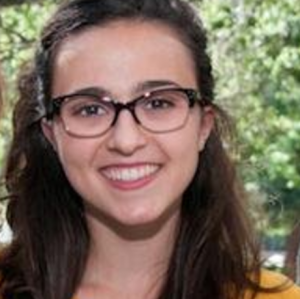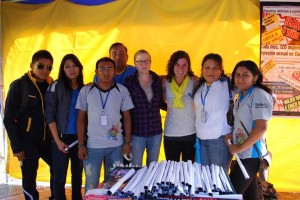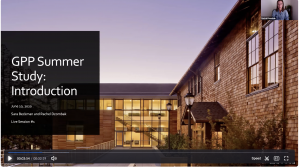By Nicholas Bobadilla
 In 2012, UC Berkeley inherited the bright-eyed, intrinsically motivated, and socially-minded Chloe Gregori. This May she graduated as a Peace and Conflict Studies major, Minh Dang Fellow, Big Ideas winner, Global Poverty and Practice minor, and this year’s Chancellor’s Public Service Award recipient: the campus’s most prestigious public service award.
In 2012, UC Berkeley inherited the bright-eyed, intrinsically motivated, and socially-minded Chloe Gregori. This May she graduated as a Peace and Conflict Studies major, Minh Dang Fellow, Big Ideas winner, Global Poverty and Practice minor, and this year’s Chancellor’s Public Service Award recipient: the campus’s most prestigious public service award.
For the past four years, Chloe has cultivated her desire to promote social justice in the realm of human trafficking, a complicated issue that involves slave labor and forced prostitution, targets vulnerable populations like children and undocumented immigrants, and casts a shadow over nations across the world, including the United States.
Chloe’s journey began in high school when she discovered Not for Sale, a San Francisco non-profit dedicated to ending human trafficking. Inspired by the organization’s mission, Chloe started a chapter at her high school to promote awareness among her peers. Extra motivation came from her father, who encouraged her to watch a documentary that followed a 16-year-old sweatshop worker in China. The film widened Chloe’s perspective to include worldwide injustices, and cemented her passion for social advocacy. “It opened my mind that we live in an interconnected world, and that my everyday purchases were created at a human cost. This realization caused me to think about global inequalities, inspiring me to learn more and take action.”
Then came Berkeley, where Chloe arrived, as most freshmen do, flustered and overwhelmed by the thousands of opportunities scattered across Sproul Plaza and every building on campus. In her sophomore year, she joined Berkeley’s Not for Sale chapter. Her responsibilities focused on educational outreach, allowing her to spread awareness about human trafficking in Bay Area high schools. That year, Chloe also had a hand in combining the three anti-trafficking organizations on Berkeley’s campus into the Berkeley Anti-Trafficking Coalition.
At the start of her junior year, Chloe focused on expanding the reach of her work. Alongside her friends and fellow anti-trafficking advocates, Sarah and Hannah Singh, she entered the Big Ideas Competition. Hosted by the Blum Center, the contest gathers students to compete for funding to foster their social impact projects. Chloe and Sarah’s idea involved partnering with the Alameda County District Attorney’s office to reach out to Bay Area high schools and educate students about human trafficking. To expand awareness on campus, Chloe, Sarah, and Hannah hosted a decal to teach students about trafficking and match them with local high school students. The following semester, their involvement with the high schools would deepen, and, as mentors, they helped students create projects that promoted awareness about the issue.
A year of hard work competing against undergraduate and graduate teams from 20 universities across the country paid off when Chloe and Sarah’s project received honorary mention and was awarded $1000. Though the partnership with the District Attorney fell through, Chloe and Sarah led the DeCal, and ensured it remained true to its advocacy and mentorship goals. Now in its fourth semester, the class hosts speakers in the field to discuss their roles and actions students can take.
Aside from campus advocacy, Chloe also spent a summer working with an organization that combats child slavery in Ghana as part of her Global Poverty & Practice minor. “I chose my practice experience because I was interested in learning about human trafficking in a development context.” Founded by an impassioned survivor James Kofi Annan, Challenging Heights provides rehabilitation, preventative education projects, and community programs to combat child trafficking in the fishing industry on Lake Volta. Chloe was fortunate to spend time among the community, gathering stories and learning about the local side effects of trafficking. “I learned a lot by completing my practice experience in a developing country,” she said, “It was a transformative experience to begin understanding the vulnerabilities that perpetuate trafficking, and to learn from a grassroots organization doing meaningful and challenging work on the ground”.
But like many people engaged in this work, Chloe has had her moments of doubt. “Human trafficking is an extremely heavy issue and difficult to combat given its complexities. Honestly, it can be very overwhelming,” she said. “Sometimes I think, what’s the point?” She described a moment of acute apprehension, when she met a woman who led a job training program for trafficking survivors. After Chloe asked the woman to speak at a conference, she responded curtly, “I don’t want to do conferences. Girls are dying. We can’t just keep talking about it.” The exchange left Chloe to question the point of advocacy given the ongoing suffering for victims and the dire need for legal advocacy and social services.
Yet she overcame this hurdle, and was able to reconcile the importance of spreading awareness about the issue given its potential to spur people to action. “The conversation made me realize how important it is to stay connected to community organizations,” she said. “As much as we can talk about these issues, it’s crucial to include people in the conversation who work in the field and/or have been affected by injustice.” She is also motivated by the myriad opportunities available to tackle the issue. “I’ve learned that there are many intersections between human trafficking and other social issues. You can be in many different fields and combat trafficking in some way either directly or indirectly.”
That belief stuck with her, and this February, she served as the lead organizer of the “Freedom in Action” conference at Berkeley. Developed with the guidance of Chloe’s mentor and reputed anti-trafficking advocate Minh Dang, the conference gathered twenty anti-trafficking organizations, hosted 15 workshops highlighting anti-trafficking methods and outcomes, and fundraised for the SHADE Project, a survivor leadership organization in the Bay Area. The conference also included workshops for survivors of human trafficking, led by survivor leaders and advocates in the Bay Area.
Chloe was proud to see the advances she and her peers had made. “The conference allowed us to strengthen relations with organizations in the community,” She said. “Leading a group of people was really valuable, and I felt fulfilled when I saw committee members develop as leaders themselves through the planning and implementation of the conference.”
Her involvement with public service and her Global Poverty & Practice minor inspired a substantial shift in her attitude toward social justice. “In high school, I was more of a do-gooder. I didn’t think about my motivations or the implications of my work,” she said. “GPP made me think of the ethical complexities of ‘doing good’, what my motivations were, and what it means to work with rather than for a community.” All common revelations among GPP students, who are encouraged to think, question, reflect, and repeat, at the risk of paralysis, all for the sake of sidestepping the potential hubris associated with social justice work. (Full disclosure: your writer is a GPP minor.)
Chloe survived this phase and emerged wiser. “In GPP, we learned social change work is slow,” she said. “It’s the struggle of working together and working with people that makes it fulfilling and enjoyable, even given how difficult or frustrating these issues can be.” She’s been fortunate to spend time sharing this perspective and connecting with fellow GPPers in her role as an advisor in the Blum Center. “The Blum Center has provided a close-knit community of students who are engaged in international issues and public service,” she said. “These issues are challenging to combat, but being with people who share these common passions is inspiring.”
For now, Chloe has her sights set on fighting human trafficking in her local Bay Area. She hopes to begin that process in the nonprofit sector and expand upon her work as an undergraduate by spreading awareness through educational initiatives. “I see myself working in education. The first step of social change is awareness. If people, especially youth, become conscious of injustice and learn concrete steps to take action in their community, I think we are on the path to positive change.” Chloe also believes in the power of advocacy on a small scale: “It can also be a conversation with someone who didn’t know about human trafficking. Even these small interactions can make a difference over time.”
Chloe also draws strength from fellow advocates faced with similar doubts, frustrations, and disappointments, but made equally resilient by their ongoing struggle. “Just having people in the field who are doing incredible work is very inspiring.” That solidarity brings strength. “Being allies with survivors and survivor advocates is a way to cope with how challenging an issue it is.”
Our hats are off to you, Chloe. We can’t wait to see where your drive and dedication will take you next.






